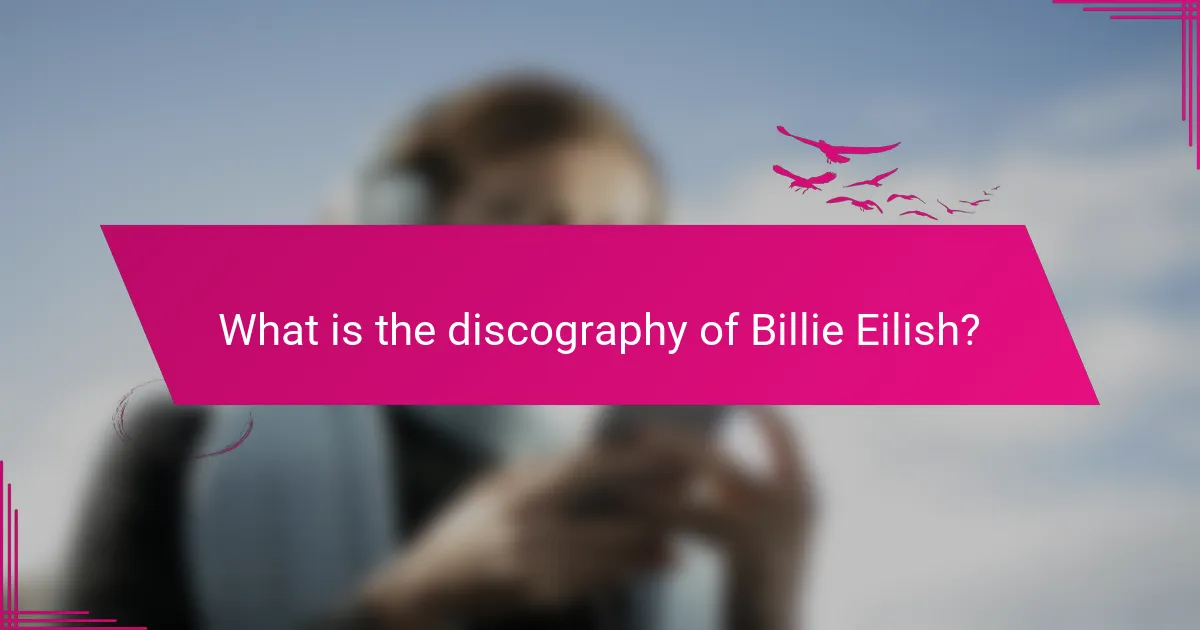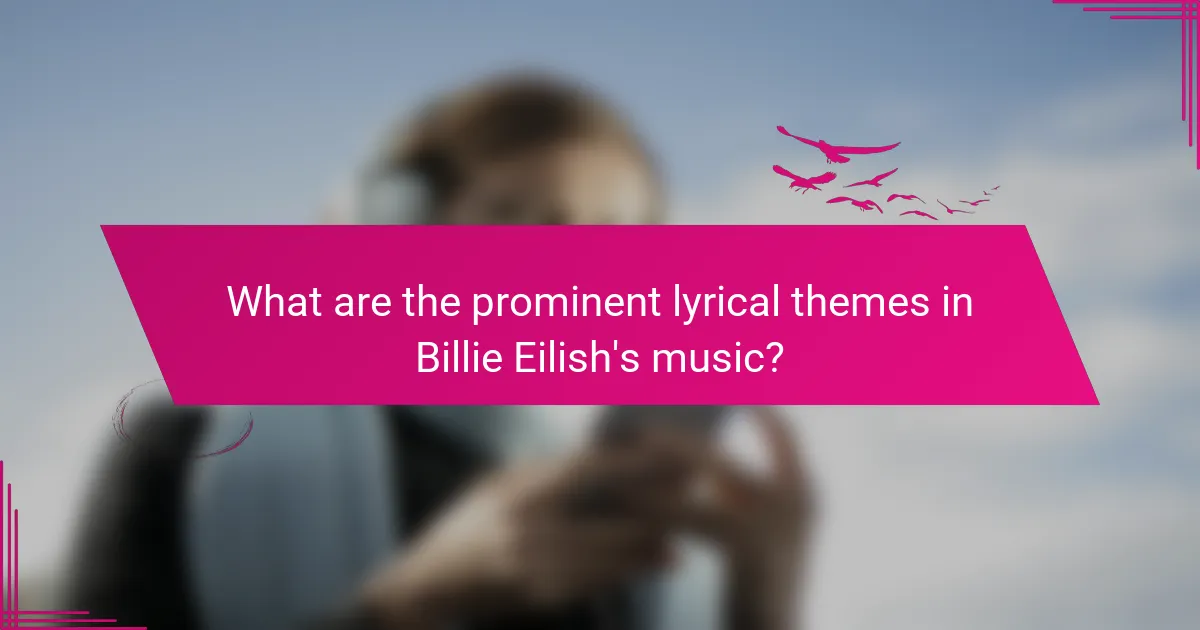Billie Eilish is a prominent American singer-songwriter known for her distinct sound and impactful lyrical themes. Her discography includes two studio albums, “When We All Fall Asleep, Where Do We Go?” (2019) and “Happier Than Ever” (2021), along with several EPs and singles. Eilish’s music frequently explores topics such as mental health, self-identity, and emotional struggles, resonating with a diverse audience. She has received multiple accolades, including five Grammy Awards, making her the youngest artist to achieve this recognition. The article will provide an overview of Eilish’s musical journey, highlighting her discography, thematic focus, and industry achievements.

What is the discography of Billie Eilish?
Billie Eilish’s discography includes two studio albums, several EPs, and numerous singles. Her debut album, “When We All Fall Asleep, Where Do We Go?” was released in 2019. This album featured hit singles like “Bad Guy” and “When the Party’s Over.”
Eilish’s second studio album, “Happier Than Ever,” was released in 2021. This album includes popular tracks such as “Your Power” and “Lost Cause.”
In addition to her albums, Eilish has released multiple EPs, including “Don’t Smile at Me” in 2017. This EP features songs like “Bellyache” and “Idontwannabeyouanymore.”
She has also collaborated with various artists, contributing to tracks such as “Lo Vas A Olvidar” with Rosalía. Eilish’s discography showcases her unique sound and lyrical themes that resonate with a wide audience.
How has Billie Eilish’s music evolved over time?
Billie Eilish’s music has evolved significantly since her debut. Initially, her sound was characterized by minimalist production and intimate lyrics. Her early tracks, like “Ocean Eyes,” showcased ethereal vocals and soft melodies. As her career progressed, she incorporated darker themes and more complex arrangements. The album “When We All Fall Asleep, Where Do We Go?” featured experimental sounds and a broader sonic palette. Lyrically, Eilish began addressing mental health and societal issues more explicitly. Collaborations with her brother Finneas further refined her unique style. Overall, her music reflects a continuous growth in artistry and thematic depth.
What are the key albums in Billie Eilish’s discography?
The key albums in Billie Eilish’s discography are “When We All Fall Asleep, Where Do We Go?”, “Don’t Smile at Me”, and “Happier Than Ever”. “When We All Fall Asleep, Where Do We Go?” was released in 2019 and debuted at number one on the Billboard 200. It features hit singles like “Bad Guy” and “Bury a Friend”. “Don’t Smile at Me” is her debut EP from 2017. It includes popular tracks such as “Ocean Eyes” and “Bellyache”. “Happier Than Ever” came out in 2021 and also reached number one on the Billboard 200. This album features songs like “Your Power” and “Lost Cause”. These albums showcase Eilish’s unique sound and lyrical themes, contributing to her recognition in the music industry.
How do singles complement her albums?
Singles enhance her albums by providing a preview of the overall sound and themes. They often feature standout tracks that showcase her unique style. For instance, “Bad Guy” generated significant buzz before the release of the album “When We All Fall Asleep, Where Do We Go?” This single’s success contributed to the album’s popularity. Additionally, singles often highlight lyrical depth and emotional resonance. They serve to engage listeners and create anticipation for the full album experience. By releasing singles strategically, Eilish maintains relevance in the music industry. This approach allows her to connect with both existing fans and new audiences.
What makes Billie Eilish’s sound unique?
Billie Eilish’s sound is unique due to its blend of minimalist production and emotionally charged lyrics. Her music often features sparse instrumentation, creating an intimate atmosphere. Eilish’s vocal style is characterized by soft, breathy tones that convey vulnerability. The incorporation of unconventional sounds and effects adds to the distinctiveness of her tracks. She frequently collaborates with her brother Finneas, who contributes to her innovative soundscapes. Eilish’s exploration of dark themes in her lyrics resonates with a wide audience. Her ability to merge pop with elements of alternative and electronic music sets her apart in the industry. The combination of these factors has garnered her critical acclaim and a dedicated fan base.
What genres influence her music style?
Billie Eilish’s music style is influenced by multiple genres including pop, electronic, and alternative. These genres contribute to her unique sound and distinct lyrical themes. Eilish incorporates elements of indie pop and synth-pop, which shape her melodic structure. Additionally, her music often reflects influences from hip-hop and R&B, evident in rhythmic patterns and vocal delivery. The blending of these genres creates an atmospheric quality in her songs. Eilish’s collaboration with producer Finneas O’Connell further enhances this genre fusion. Their innovative approach results in a fresh take on contemporary music. This genre diversity is a key factor in her widespread appeal and critical acclaim.
How does production contribute to her sound?
Production shapes Billie Eilish’s sound through innovative techniques and unique arrangements. Her brother, Finneas O’Connell, is the primary producer, contributing a distinct sonic identity. They utilize minimalistic instrumentation, often featuring sparse beats and ambient sounds. This approach creates an intimate atmosphere that complements her vocal style. The production also incorporates unconventional sounds, such as whispers and layered harmonies. These elements enhance the emotional depth of her lyrics. Additionally, the use of silence and space in production adds tension and impact to her songs. This combination results in a signature sound that is both modern and relatable.

What are the prominent lyrical themes in Billie Eilish’s music?
Billie Eilish’s music prominently explores themes of mental health, self-identity, and emotional struggles. Her lyrics often reflect feelings of anxiety and depression. Songs like “Bellyache” and “When the Party’s Over” illustrate guilt and heartbreak. Eilish also addresses societal issues, including fame and its pressures. The theme of isolation is prevalent in her tracks, emphasizing personal experiences. Additionally, she incorporates elements of vulnerability and intimacy in her songwriting. This combination creates a relatable narrative for her audience. Eilish’s unique perspective resonates with listeners, contributing to her widespread acclaim.
How do personal experiences shape her lyrics?
Personal experiences significantly shape Billie Eilish’s lyrics. Her songs often reflect her emotions and life events. Eilish draws from her struggles with mental health and relationships. She has openly discussed her experiences with anxiety and depression. These themes resonate in tracks like “Bellyache” and “When the Party’s Over.” Eilish’s lyrics are known for their vulnerability and authenticity. This connection to her personal life makes her music relatable to many listeners. Her songwriting process frequently involves introspection and storytelling.
What recurring motifs appear in her songwriting?
Recurring motifs in Billie Eilish’s songwriting include themes of heartbreak, mental health, and self-reflection. She often explores emotional vulnerability and the complexities of relationships. Eilish’s lyrics frequently depict feelings of isolation and anxiety. Imagery of darkness and light contrasts also appears throughout her work. Additionally, there are motifs related to youth and the pressures of fame. Her songs often incorporate personal experiences and storytelling elements. This thematic consistency contributes to her unique sound and resonates with listeners.
How does Billie Eilish address mental health in her lyrics?
Billie Eilish addresses mental health in her lyrics by openly discussing her struggles with anxiety and depression. She often uses vivid imagery to convey feelings of isolation and despair. For example, in her song “Bellyache,” she reflects on guilt and the emotional turmoil following a wrong decision. In “Everything I Wanted,” she expresses vulnerability and the pressure of fame on her mental well-being. Eilish’s lyrics resonate with listeners, as they portray authentic experiences with mental health issues. Her candidness helps destigmatize these topics, encouraging conversations about mental health. Through her music, Eilish provides solace to those facing similar challenges.
Why are her lyrics relatable to a younger audience?
Her lyrics are relatable to a younger audience because they address themes of mental health, self-identity, and societal pressures. Billie Eilish often expresses feelings of anxiety and insecurity that resonate with many young people. Her candid storytelling creates a sense of authenticity and connection. Additionally, her use of contemporary language and imagery reflects the experiences of today’s youth. Studies show that music addressing emotional struggles can foster a sense of belonging among listeners. Eilish’s ability to articulate complex emotions in a straightforward manner enhances her relatability.
What storytelling techniques does she employ?
Billie Eilish employs vivid imagery and personal anecdotes in her storytelling techniques. Her lyrics often evoke strong visual scenes that resonate with listeners. Eilish utilizes metaphors to convey complex emotions succinctly. She also incorporates a conversational tone, making her narratives relatable. The use of repetition emphasizes key themes in her songs. Additionally, she often explores darker themes, creating a haunting atmosphere. This approach enhances the emotional depth of her music. Eilish’s storytelling techniques contribute significantly to her unique sound and lyrical themes.
How do her lyrics reflect societal issues?
Her lyrics reflect societal issues by addressing themes such as mental health, climate change, and social justice. Billie Eilish often discusses anxiety and depression, showcasing the struggles many face today. In songs like “Bellyache,” she explores guilt and moral dilemmas, resonating with listeners’ experiences. Additionally, her track “All the Good Girls Go to Hell” critiques environmental neglect and climate inaction. This song uses vivid imagery to highlight the urgency of climate change. Eilish’s lyrics serve as a voice for younger generations grappling with these challenges. Through her music, she raises awareness and encourages dialogue about pressing societal concerns.

What industry recognition has Billie Eilish received?
Billie Eilish has received numerous industry recognitions. She won five Grammy Awards at the 62nd Annual Grammy Awards in 2020. This included Album of the Year, Record of the Year, and Song of the Year. Eilish is the youngest artist to achieve this feat. She has also received American Music Awards and Billboard Music Awards. In 2021, she won the Golden Globe Award for Best Original Song. Eilish’s unique sound and lyrical themes have garnered critical acclaim. Her influence on contemporary music is widely recognized.
What awards has she won throughout her career?
Billie Eilish has won numerous awards throughout her career. She has received multiple Grammy Awards, including Album of the Year for “When We All Fall Asleep, Where Do We Go?” in 2020. Eilish also won Record of the Year and Song of the Year for “Bad Guy.” In addition, she has been honored with American Music Awards and MTV Video Music Awards. Her achievements include a Golden Globe Award for Best Original Song for “No Time to Die.” These accolades highlight her impact on the music industry and her unique artistry.
How do her achievements compare to other artists?
Billie Eilish’s achievements are significant compared to other artists. She has won multiple Grammy Awards, including Album of the Year for “When We All Fall Asleep, Where Do We Go?” in 2020. Eilish is the youngest artist to win this prestigious award. Her single “Bad Guy” topped the Billboard Hot 100, marking her first number-one hit. Eilish has set records for streaming on platforms like Spotify, surpassing billions of streams. Additionally, she has received accolades for her unique sound and lyrical themes, resonating with a diverse audience. These accomplishments place her among the most influential artists of her generation.
What milestones mark her impact on the music industry?
Billie Eilish has significantly impacted the music industry through various milestones. She became the youngest artist to win all four major Grammy Awards in 2020. Her debut album, “When We All Fall Asleep, Where Do We Go?”, debuted at number one on the Billboard 200 chart. Eilish’s single “Bad Guy” reached number one on the Billboard Hot 100 chart, marking a breakthrough for alternative pop music. She has achieved multiple platinum certifications for her singles and albums, reflecting widespread commercial success. Eilish’s unique sound has influenced a new generation of artists, blending pop, electronic, and indie genres. Her music often tackles complex themes, resonating with a diverse audience. Eilish’s visual aesthetics and music videos have set new standards in the industry, emphasizing creativity and storytelling.
How has Billie Eilish influenced contemporary music?
Billie Eilish has significantly influenced contemporary music through her innovative sound and lyrical depth. Her music blends pop, electronic, and indie elements, creating a unique auditory experience. Eilish’s production style often features minimalist arrangements and layered vocals. This approach has inspired many emerging artists to experiment with similar techniques.
Her lyrics tackle complex themes such as mental health, identity, and societal pressures. This candidness resonates with a younger audience, encouraging openness about personal struggles. Eilish’s success, including multiple Grammy Awards, has disrupted traditional music industry norms. She has proven that artists can achieve mainstream success without conforming to established standards.
Eilish’s influence extends beyond her music to fashion and visual aesthetics, shaping contemporary youth culture. Her distinct style and imagery challenge conventional norms in the industry. Overall, Billie Eilish’s contributions have redefined the soundscape of modern music.
What role does she play in shaping trends in pop music?
Billie Eilish plays a significant role in shaping trends in pop music through her innovative sound and unique aesthetic. Her music often blends genres, incorporating elements of pop, electronic, and indie influences. This genre-defying approach has inspired many emerging artists to experiment with their own sounds. Eilish’s lyrical themes frequently address mental health, identity, and societal issues, resonating deeply with a younger audience. Her authenticity and vulnerability in songwriting have set a new standard for emotional expression in pop music.
Moreover, Eilish’s visual style, characterized by bold fashion choices and distinct music videos, has influenced pop culture and fashion trends. She often collaborates with her brother, Finneas, who plays a crucial role in her production, showcasing the power of collaboration in the industry. Eilish’s success, including multiple Grammy Awards, highlights her impact on the music landscape. This recognition has encouraged record labels to seek out artists with similar artistic visions. Overall, Billie Eilish’s contributions have significantly reshaped the direction of contemporary pop music.
How do her collaborations enhance her recognition?
Her collaborations enhance her recognition by expanding her audience reach. Working with established artists introduces her to their fan bases. This exposure increases her visibility in the music industry. Collaborations often lead to chart-topping hits, further solidifying her status. For example, her collaboration with Khalid on “Lovely” gained over a billion streams. Such successful partnerships elevate her profile among peers and critics. They also showcase her versatility across different music genres. Overall, collaborations play a crucial role in her growing fame.
What can fans expect from Billie Eilish’s future releases?
Fans can expect Billie Eilish’s future releases to continue showcasing her unique sound and lyrical depth. Eilish is known for blending pop with alternative and electronic influences. Her music often explores themes of mental health, relationships, and self-identity. Recent trends indicate she may experiment with new genres and collaborations. Eilish has hinted at evolving her sound while maintaining her signature style. Her previous albums have received critical acclaim, setting high expectations for future work. The anticipation is fueled by her innovative approach to music and visual storytelling. Fans can look forward to more introspective lyrics and captivating melodies.
How does she plan to evolve her sound and themes?
Billie Eilish plans to evolve her sound and themes by experimenting with new genres and collaborations. She has expressed interest in incorporating more diverse musical influences. Eilish aims to explore deeper emotional themes in her lyrics. She wants to address broader societal issues in her songs. Her recent interviews indicate a desire for artistic growth. Eilish has mentioned wanting to challenge herself creatively. This evolution reflects her commitment to pushing musical boundaries. Her past work shows a willingness to innovate and adapt.
What upcoming projects are on the horizon for her?
Billie Eilish is set to release new music in 2024. She has confirmed that she is working on her third studio album. Eilish mentioned in interviews that the album will explore new themes and sounds. Additionally, she is planning a world tour to promote the album. The tour is expected to start in late 2024. Eilish’s team has not disclosed specific dates yet. Fans are eagerly anticipating these upcoming projects.
The main entity of this article is Billie Eilish, a prominent artist known for her unique sound and impactful lyrics. The article provides a comprehensive overview of Eilish’s discography, highlighting her two studio albums, notable EPs, and significant singles that showcase her evolution as an artist. It discusses key albums such as “When We All Fall Asleep, Where Do We Go?” and “Happier Than Ever,” as well as the themes of mental health, self-identity, and societal issues that permeate her work. Additionally, the article examines her industry recognition, including Grammy Awards, and her influence on contemporary music trends.